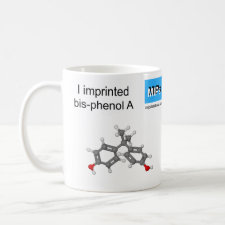
Authors: Liu F, Liu Q, Zhang YH, Liu YJ, Wan YC, Gao KC, Huang Y, Xia W, Wang HY, Shi Y, Huang Z, Lu B
Article Title: Molecularly imprinted nanofiber membranes enhanced biodegradation of trace bisphenol A by Pseudomonas aeruginosa.
Publication date: 2015
Journal: Chemical Engineering Journal
Volume: 262
Page numbers: 989-998.
DOI: 10.1016/j.cej.2014.10.046
Alternative URL: http://www.sciencedirect.com/science/article/pii/S1385894714013783
Abstract: Molecularly imprinted nanofiber membranes (MIM) were used to enhance the degradation of trace bisphenol A (BPA) by Pseudomonas aeruginosa. MIM were prepared by encapsulating BPA-imprinted polymeric nanoparticles (MIPs) into biocompatible polyvinyl alcohol (PVA) nanofibers using electrospinning. MIPs inside MIM could enrich BPA and its intermediate metabolites 4-hydroxyacetophenone (HAP) selectively. At the same time, BPA degrading-bacteria P. aeruginosa could be attached and immobilized on the biocompatible MIM. BPA and HAP enriched by the MIM increased the substratesG«÷ concentration in the vicinity of the immobilized bacteria, which enhanced the degradation efficiencies. The increased BPA level and the amounts of immobilized bacteria on the membranes were strongly correlated to BPA biodegradation rate (r = 0.90 and 0.87, respectively). The enhancement of MIM on biodegradation was significant in water containing interferences as well as in environmental water. The MIM could continuously enhance the degradation of trace BPA (2 μg/L) in waste water during a 10-day experiment. After 24 h of hydraulic retention time, BPA level in the effluent was below the limit of detection (<0.026 μg/L). The combination of MIM with BPA-degrading bacteria provided a simple and practical method for in situ biodegradation of trace BPA in water
Template and target information: bisphenol A, BPA
Author keywords: bisphenol A, molecularly imprinted nanofiber membranes, selective enrichment, Immobilized bacteria, In situ biodegradation, enhancement



Join the Society for Molecular Imprinting

New items RSS feed
Sign-up for e-mail updates:
Choose between receiving an occasional newsletter or more frequent e-mail alerts.
Click here to go to the sign-up page.
Is your name elemental or peptidic? Enter your name and find out by clicking either of the buttons below!
Other products you may like:
 MIPdatabase
MIPdatabase









